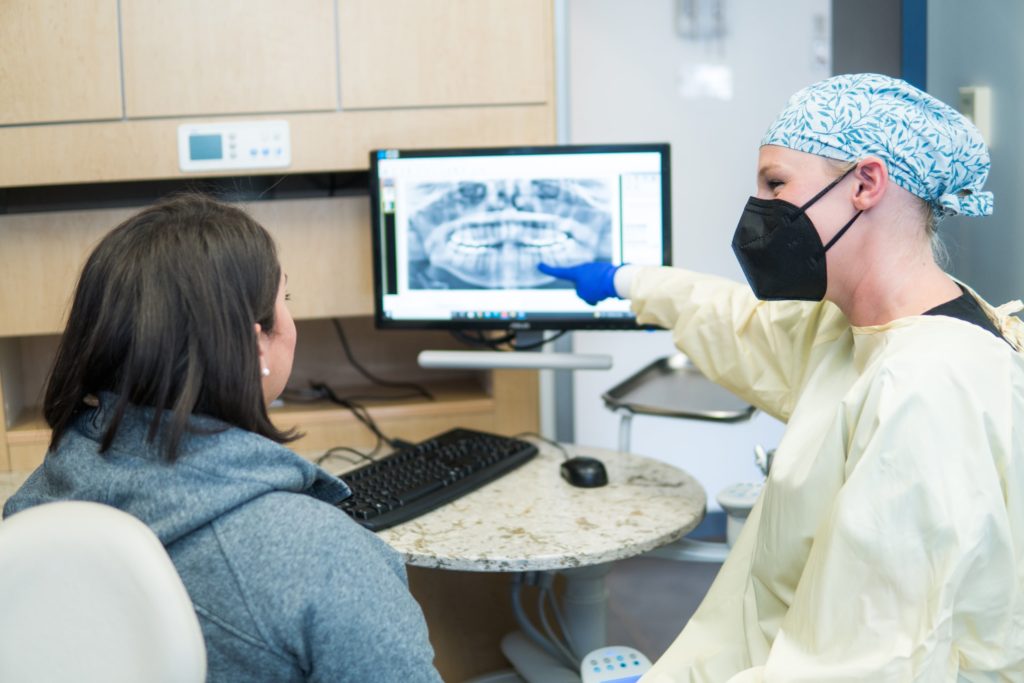Root canal
We do all that we can to maintain our healthy smile for as long as possible. No matter how hard we try to avoid tooth decay, sometimes a cavity forms in places where we can’t see.
The longer a surface cavity is left unchecked the more time it has to increase in size, and the deeper it can penetrate the tooth until it eventually gets to the nerve. This is where root canal therapy comes in to save your tooth and get you back to your pain-free everyday routine.
If you are experiencing mild to severe discomfort in one of your teeth then it’s time to have it examined. Simply fill out our contact form and one of our team members will reach out to set up an appointment.


What is a root canal?
It is easy to forget that inside each and every one of our hard teeth is a soft pulp that contains tiny blood vessels and nerve endings.
The root can become exposed if tooth decay or a receding gumline is left untreated. If this happens it can lead to an infection or increased tooth sensitivity.
A root canal is a procedure we use to remove the infected or injured pulp and fill it to preserve the tooth. Unlike the old days, this can be done in a single visit in most cases—you can learn more about the process below.
This can be done with minimal anxiety, discomfort or pain with our sedation dentistry options.
Root canal FAQ
Here are some common concerns people have about the root canal procedure.
How do I know if I need a root canal?
If you are experiencing mild to severe sensitivity in one or more teeth it may be time for a root canal. Other potential symptoms to watch out for include swelling of the gums, darkening of the tooth, or a little bump near the sensitive area. But you’ll need to have a dentist take a look at your tooth to confirm what’s happening.
How soon can I return to work after a root canal?
Everybody is different, but we recommend that you get some rest on the day of your procedure. Some people may be able to go back to work the next day, others will need 2 or 3 days before returning to work. Your dentist will advise you on the best course of action for your particular situation based on how you’re feeling.
If you have requested the use of sedation dentistry for your root canal procedure then you may need somebody to drive you home. It is not advisable to operate a vehicle or any other type of heavy machinery after receiving certain levels of dental sedation. In most cases it is generally safe to drive after receiving local anesthesia.
Will my root canal procedure hurt?
The urban myth about exaggerated pain associated with root canal procedures has persisted for decades, most likely propagated by those who have never experienced one.
The site of the root canal is fully numbed before any work is done and your dentist may prescribe pain management medication to ease discomfort after the procedure is complete.
What kinds of fees are associated with root canals?
Your dentist will advise you on the cost of the procedure before doing any work so you know what to expect. If you have dental insurance, the procedure may be covered in full, or in part, depending on your plan. Please consult your insurance company for details on coverage.
What is the process for a root canal?
First, local anesthesia is applied to the area. Your dentist will run a few checks to make sure that the area is fully numb before proceeding further. Next your dentist will make a tiny hole in your tooth so they are able to extract the compromised pulp.
The interior of the tooth will be fully cleaned and disinfected before the tooth is filled. The biocompatible material used to fill the tooth is known as gutta-percha, a safe and effective thermoplastic solution that has been in use for decades.
Finally, your dentist will seal the tooth. All of this is usually completed within a single visit.
What happens if I don’t get a root canal when recommended by my dentist?
An infected root should be taken seriously. If left untreated the infection can spread into the jaw bone and result in the loss of the tooth and/or bone tissue. The infection could spread into the rest of your body and potentially become life threatening.
We’d like to meet you
From the initial contact form to the dental chair, our team will ensure you have a worry-free experience. We know that the need for a root canal may cause anxiety in some people and we’re here to let you know that there is no reason to feel this way.
We have many options for dental anxiety and our dentists are professionals with years of successful root canals under their belt, so you can rest assured that your procedure will be free of discomfort as much as modern medicine will permit.
Simply fill out the contact form and one of our team members will reach out to you to set up an appointment.
